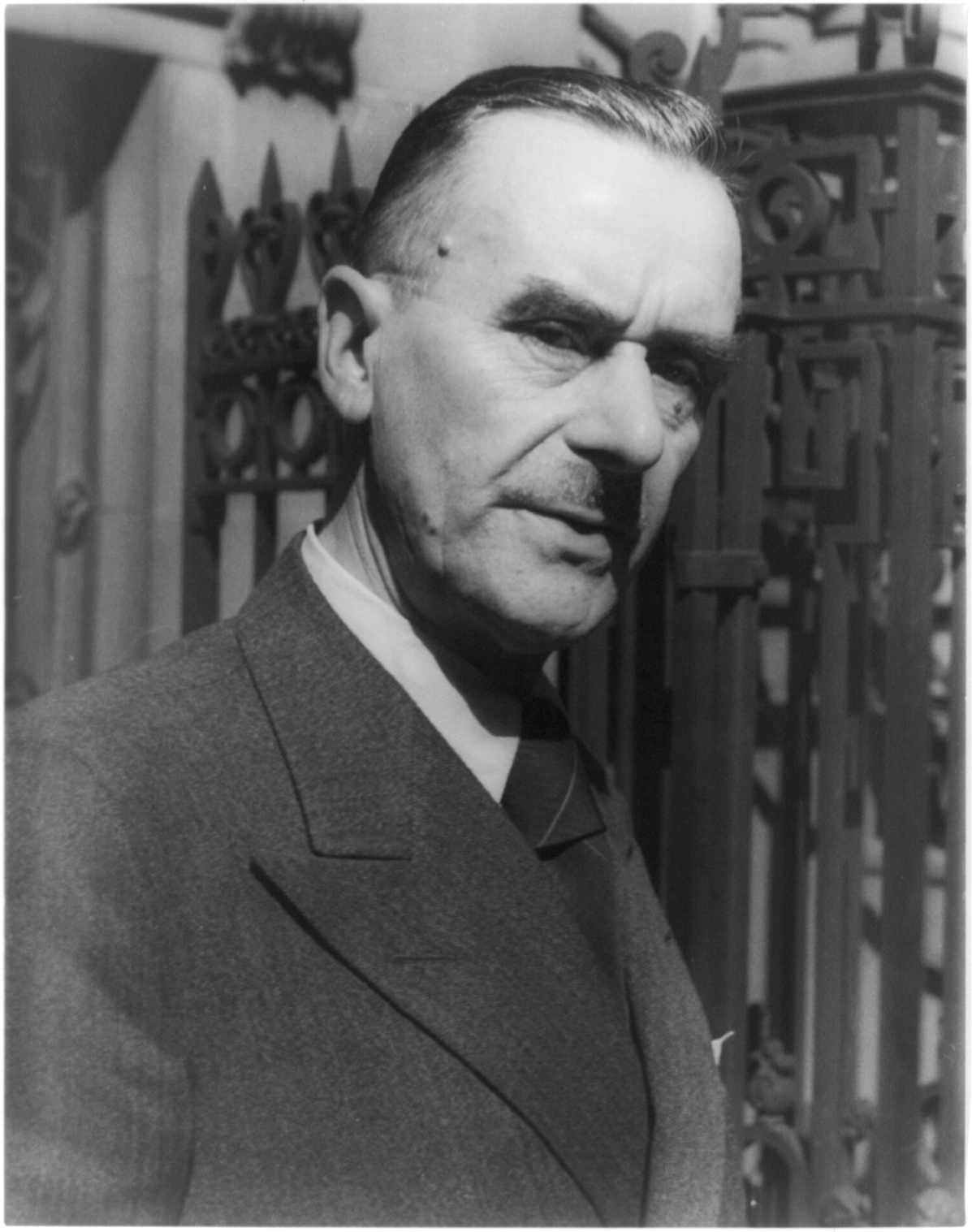Death in Venice
Frases célebres de Thomas Mann
“La tolerancia es un crimen cuando lo que se tolera es la maldad.”
Fuente: María V. C. Frases inspiradoras: Lo único imposible es aquello que no intentas. Editorial Grupo Fénix CR, 2017. p. 83.
“Pensad como hombres de acción, actuad como hombres pensantes.”
Fuente: Herrera Carles, Humberto. 1500 Frases, pensamientos para la vida. Editor Lulu.com. ISBN 9781105216565. p. 47.
“La guerra es la salida más cobarde de los problemas de la paz.”
Fuente: Citado en Martín Pascual, Gerardo. En el corazón de otros tiempos. Editorial Visión Libros. ISBN 9788499832821. p. 181.
Frases de hombres de Thomas Mann
Los orígenes del «Doktor Faustus»
La muerte en Venecia / Mario y el mago
Frases de mundo de Thomas Mann
Confessions of Felix Krull, Confidence Man: The Early Years
“¿Por qué todo el mundo que quiere migrar o buscar un trabajo se dirige a mí?”
Los orígenes del «Doktor Faustus»
Death in Venice
Thomas Mann Frases y Citas
The Magic Mountain
Death in Venice
Variante: La soledad hace madurar lo original, lo audaz e inquietamente bello, el poema. Pero también engendra lo erróneo, desproporcionado, absurdo e ilícito.
La montaña mágica
La montaña mágica
“El que nace para ser ahorcado nunca morirá ahogado.”
Fuente: Ortega Blake, Arturo. El gran libro de las frases célebres. Editorial Penguin Random House Grupo Editorial México, 2013 ISBN 978-60-7311-631-2.
Fuente: Citado en Zuleta, Estanislao. Thomas Mann, La montaña mágica y la llanura prosaica. 2ª Edición. Hombre Nuevo Editores, 2003. p. 309.
“La belleza, como el dolor, hace sufrir.”
Fuente: Israel, Ricardo. El libro de las verdades. Citas citables. Editorial RIL Editores, 2011. p. 12.
“El escritor es aquel al que escribir le resulta más difícil que a las demás personas.”
Fuente: Citado en Marina, José Antonio. La magia de escribir. Editorial Penguin Random House Grupo Editorial España, 2010. ISBN 9788401390456.
Fuente: Citado en Becerra, David. La Guerra Civil como moda literaria. Editorial Clave Intelectual, 2016. ISBN 9788494528149. p. 1897.
Fuente: Domenico Losurdo en Stalin: historia y crítica de una leyenda negra, p. 17.
Confesiones del estafador Félix Krull
“la palabra es enemiga de lo misterioso y cruel delatora de lo vulgar.”
Confesiones del estafador Félix Krull
La muerte en venecia/Las tablas de la ley
La montaña mágica
Death in Venice
“Quien toma en serio a Nietzsche, quien lo toma al pie de la letra y le cree, está perdido.”
Fuente: Citado en Sebreli, Juan José. El olvido de la razón. Editorial Penguin Random House Grupo Editorial Argentina, 2011. ISBN 9789500734769.
Thomas Mann: Frases en inglés
"This War" (1939); also in Order of the Day (1942)
Fuente: Death in Venice (1912), Ch. 3, as translated by David Luke
“The beautiful word begets the beautiful deed.”
Fuente: The Magic Mountain (1924), Ch. 4
“A man’s dying is more the survivors’ affair than his own.”
Fuente: The Magic Mountain (1924), Ch. 6
Letter from Naples, Italy to Otto Grautoff (1896); as quoted in A Gorgon's Mask: The Mother in Thomas Mann's Fiction (2005) by Lewis A. Lawson, p. 35
"Sleep, Sweet Sleep" [Süßer Schlaf] first published in Neue Freie Presse [Vienna] (30 May 1909), as translated by Helen T. Knopf in Past Masters and Other Papers (1933), p. 269
“Only he who desires is amiable and not he who is satiated.”
Bk. 1, Ch. 8
Confessions of Felix Krull, Confidence Man (1954)
Speech, "The War and the Future" (1940); published in Order of the Day (1942)
Fuente: Death in Venice (1912), Ch. 4, as translated by David Luke
Fuente: Death in Venice (1912), Ch. 4, as translated by David Luke
“Asia surrounds us — wherever one’s glance rests, a Tartar physiognomy.”
Asien verschlingt uns. Wohin man blickt: tatarische Gesichter.
Variant translation: Asia devours us. Wherever one looks: Tartar faces.
Settembrini in Ch. 5
The Magic Mountain (1924)
The Coming Victory of Democracy (1938), p. 14, translated by Agnes E. Meyer, Knopf (1938)
“O scenes of the beautiful world! Never have you presented yourself to more appreciative eyes.”
Bk. 2, Ch. 4
Confessions of Felix Krull, Confidence Man (1954)
Bk. 2, Ch. 4
Confessions of Felix Krull, Confidence Man (1954)
As quoted in Sculpting in Time (1996), by Andrei Tarkovsky, p. 56
Fuente: Death in Venice (1912), Ch. 5, as translated by David Luke
Speech at the Prussian Academy of Art in Berlin (22 January 1929); also in Essays of Three Decades (1942)
“Disease makes men more physical, it leaves them nothing but body.”
Fuente: The Magic Mountain (1924), Ch. 4
On a short story of the character, "Gustav Aschenbach". Ch. 2, as translated by David Luke
Death in Venice (1912)
Letter, (1950); as quoted in Thomas Mann — The Birth of Criticism (1987) by Marcel Reich-Ranicki
“Beer, tobacco, and music,” he went on. “Behold the Fatherland.”
"Herr Settembrini" commenting on Germany, in Ch. 4
The Magic Mountain (1924)
“Love as a force contributory to disease.”
The title of "Dr. Krokowski" lectures. Ch. 4
The Magic Mountain (1924)
Settembrini on the Magic Mountain Society, in Ch. 5
The Magic Mountain (1924)
“Human reason needs only to will more strongly than fate, and she is fate.”
Fuente: The Magic Mountain (1924), Ch. 6
